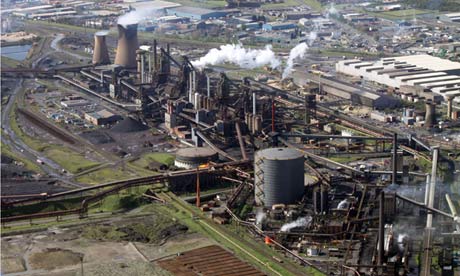The European Union's flagship climate policy, its emissions trading scheme (ETS), saw the price of carbon crash to a record low on Thursday after a vote in Brussels against a proposal to support the struggling market.
The price of a permit to emit a tonne of carbon dioxide fell 40% at one point to €2.81 today, far below its record high of €32, before recovering to more than €4 later in the day.
The ETS, aimed at reducing emissions from Europe's entire energy and industrial sectors, has been plagued by an oversupply of permits due in part to over-generous initial allocations following lobbying by industry.
"This should be the final wake-up call both to governments and to the European parliament," said Connie Hedegaard, EU climate commissioner. "To those in industry who both say that they want a strong EU ETS while they at the same time lobby against the policies that can secure exactly that I say: it is time to think twice.''
David Hone, climate change adviser for oil company Shell, said policy makers needed to focus on delivering a clear carbon price, rather than setting targets for renewable energy. "Many in the business community have been clear on this issue for over a decade - it's all about putting a price on carbon."
"The dinosaurs of European industry are holding progress back at the expense of all those businesses that would benefit," said Lady Worthington, Labour peer and founder of carbon-trading thinktankSandbag. "The wrong people - those who have not invested in energy efficiency and emissions reductions - get rewarded if the carbon price is low." Sandbag calculates that there will be an excess of 2.2bn permits by 2020.
Thursday's freefall in the ETS was prompted by the energy and industry committee of the European parliament opposing a proposal to delay the release of 900m future permits, so-called "backloading". This would limit supply in the capped market and therefore support the carbon price. Analysts believe such a move could raise carbon prices to €15, but say prices above €20 are needed to give utilities the incentive to make serious switches to lower carbon energy generation.
"Until there is a clear will to give legislative support to this market we cannot expect participants to keep believing in it," said one emissions trader.
The European commission warned this week that without action the carbon price could drop dramatically, leaving the ETS irrelevant and EU energy and environment policy unravelling. Coal-intensive Poland is opposed to reform, while the UK wants a more ambitious plan, with 1.2bn permits delayed. Germany, the EU's most influential member on industrial policy, is undecided.
The ETS was launched in 2005 and prices crashed during the first trading period to near zero in 2007, because of the over-allocation of permits. But traders today dismiss that collapse, blaming it on early errors in the experimental phase of the market. The carbon price hit a peak of €32 in April 2006 and traded above €30 in 2008. Thursday's price is the lowest since the second trading period began.
Thursday's vote is non-binding and more decisive votes will take place in the environment committee in February and a European parliament plenary session in March. "There are good signs they will vote the right way," said Lady Worthington, who supports the postponement of permits but argues that many must be permanently removed. "I think there is a reasonably good chance of getting the backloading measure passed by March."
Hedegaard said: "Few would disagree that the ETS - a market-based cap and trade system - is the most cost-efficient tool in EU climate politics. If in doubt look at all the big economies now following the EU example by establishing similar ETS systems: Australia, Korea, California and China."
Whatever the outcome in Brussels, analysts say the ETS will limp along, even if the carbon price is so low as to provide no incentive at all for emissions reductions, because dismantling the scheme would be as complicated as reforming it.

No comments:
Post a Comment